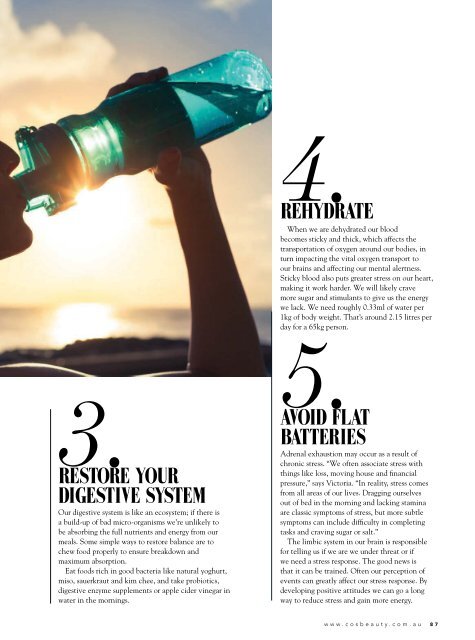CosBeauty Magazine #76
The go to beauty, health and lifestyle magazine for Australians who want to look and feel their best.
The go to beauty, health and lifestyle magazine for Australians who want to look and feel their best.
You also want an ePaper? Increase the reach of your titles
YUMPU automatically turns print PDFs into web optimized ePapers that Google loves.
3.<br />
RESTORE YOUR<br />
DIGESTIVE SYSTEM<br />
Our digestive system is like an ecosystem; if there is<br />
a build-up of bad micro-organisms we’re unlikely to<br />
be absorbing the full nutrients and energy from our<br />
meals. Some simple ways to restore balance are to<br />
chew food properly to ensure breakdown and<br />
maximum absorption.<br />
Eat foods rich in good bacteria like natural yoghurt,<br />
miso, sauerkraut and kim chee, and take probiotics,<br />
digestive enzyme supplements or apple cider vinegar in<br />
water in the mornings.<br />
4.<br />
REHYDRATE<br />
When we are dehydrated our blood<br />
becomes sticky and thick, which affects the<br />
transportation of oxygen around our bodies, in<br />
turn impacting the vital oxygen transport to<br />
our brains and affecting our mental alertness.<br />
Sticky blood also puts greater stress on our heart,<br />
making it work harder. We will likely crave<br />
more sugar and stimulants to give us the energy<br />
we lack. We need roughly 0.33ml of water per<br />
1kg of body weight. That’s around 2.15 litres per<br />
5.<br />
day for a 65kg person.<br />
aVOID FLAT<br />
BATTERIES<br />
Adrenal exhaustion may occur as a result of<br />
chronic stress. “We often associate stress with<br />
things like loss, moving house and financial<br />
pressure,” says Victoria. “In reality, stress comes<br />
from all areas of our lives. Dragging ourselves<br />
out of bed in the morning and lacking stamina<br />
are classic symptoms of stress, but more subtle<br />
symptoms can include difficulty in completing<br />
tasks and craving sugar or salt.”<br />
The limbic system in our brain is responsible<br />
for telling us if we are we under threat or if<br />
we need a stress response. The good news is<br />
that it can be trained. Often our perception of<br />
events can greatly affect our stress response. By<br />
developing positive attitudes we can go a long<br />
way to reduce stress and gain more energy.<br />
www.cosbeauty.com.au 87

















